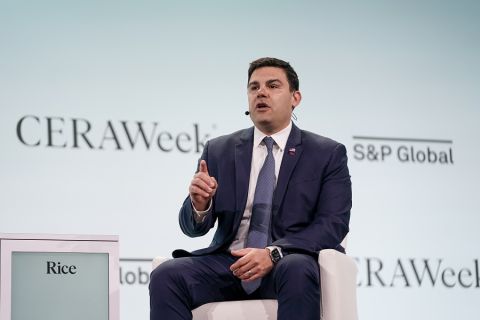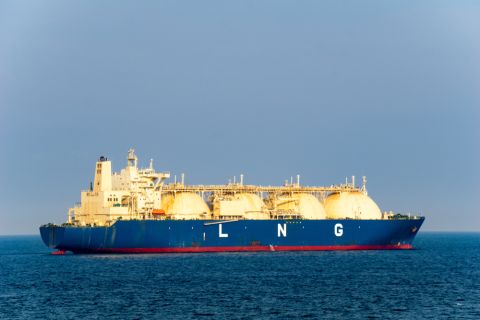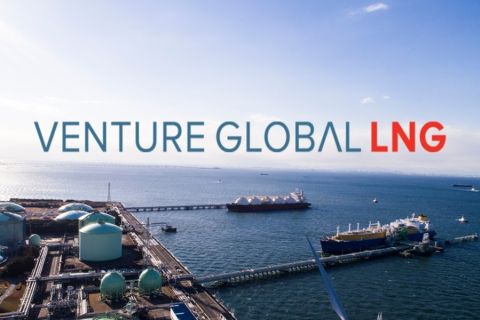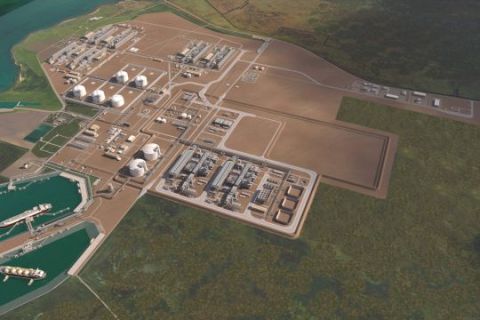Norway's Yara and Canada's Enbridge plan to invest up to $2.9 billion to build a low-carbon blue ammonia production plant in Texas, they said on March 31.
Blue ammonia, rather than green ammonia derived from renewable energy, refers to ammonia produced from natural gas, with the CO2 byproduct captured and stored.
The plant, which will be Yara's biggest, is to be built at the Enbridge Ingleside Energy Center near Corpus Christi, with the start of production planned for 2027-2028, the companies said.
Yara, which already has a majority stake in a facility in Freeport further along the Gulf coast, is the latest European company to announce a major investment in the United States.
While the project was planned long before last year's U.S. Inflation Reduction Act (IRA), the increase in carbon storage tax credits in that act has made it even more attractive, the Norwegian company said.
Yara also aims to take advantage of low U.S. gas prices, said Magnus Krogh Ankarstrand, president of Yara Clean Ammonia.
"We've focused on the United States for two reasons and the first is low energy prices, naturally, and the other is that carbon capture is accessible at an attractive cost," he told Reuters.
Fertiliser maker Yara intends to buy all of the plant's output and aims to supply low-carbon ammonia as a feedstock in its global production system, including Europe, as well as serving new clean ammonia markets such as shipping fuel.
The plant will be able to supply 1.2 MMton to 1.4 MMton of low-carbon ammonia per year.
About 95% of the CO2 generated from the production process is expected to be captured and transported to nearby permanent geologic storage.
The Oslo-listed firm last year cut much of its European production, citing high energy costs, and currently imports about 1 million tonnes of ammonia to Europe per year.
High gas prices in Europe have made the case to build in the U.S. stronger, Ankarstrand said.
"But prices in the U.S. have been attractive for a long time, and in addition there is already a tax credit in place for carbon capture in the U.S.," he said.
The IRA, passed last year, offers companies a tax credit of as much as $85 per ton of captured carbon stored underground.
"What happened with the Inflation Reduction Act after the summer has made this investment even more attractive," Ankarstrand said.
Recommended Reading
EQT’s Toby Rice: US NatGas is a Global ‘Decarbonizing Force’
2024-03-21 - The shale revolution has unlocked an amazing resource but it is far from reaching full potential as a lot more opportunities exist, EQT Corp. President and CEO Toby Rice said in a plenary session during CERAWeek by S&P Global.
Watson: Implications of LNG Pause
2024-03-07 - Critical questions remain for LNG on the heels of the Biden administration's pause on LNG export permits to non-Free Trade Agreement countries.
Venture Global Seeks FERC Actions on LNG Projects with Sense of Urgency
2024-02-21 - Venture Global files requests with the Federal Energy Regulatory Commission for Calcasieu Pass 1 and 2 before a potential vacancy on the commission brings approvals to a standstill.
Belcher: Election Year LNG ‘Pause’ Will Have Huge Negative Impacts
2024-03-01 - The Biden administration’s decision to pause permitting of LNG projects has damaged the U.S.’ reputation in ways impossible to calculate.
Despite LNG Permitting Risks, Cheniere Expansions Continue
2024-02-28 - U.S.-based Cheniere Energy expects the U.S. market, which exported 86 million tonnes per annum (mtpa) of LNG in 2023, will be the first to surpass the 200 mtpa mark—even taking into account a recent pause on approvals related to new U.S. LNG projects.





